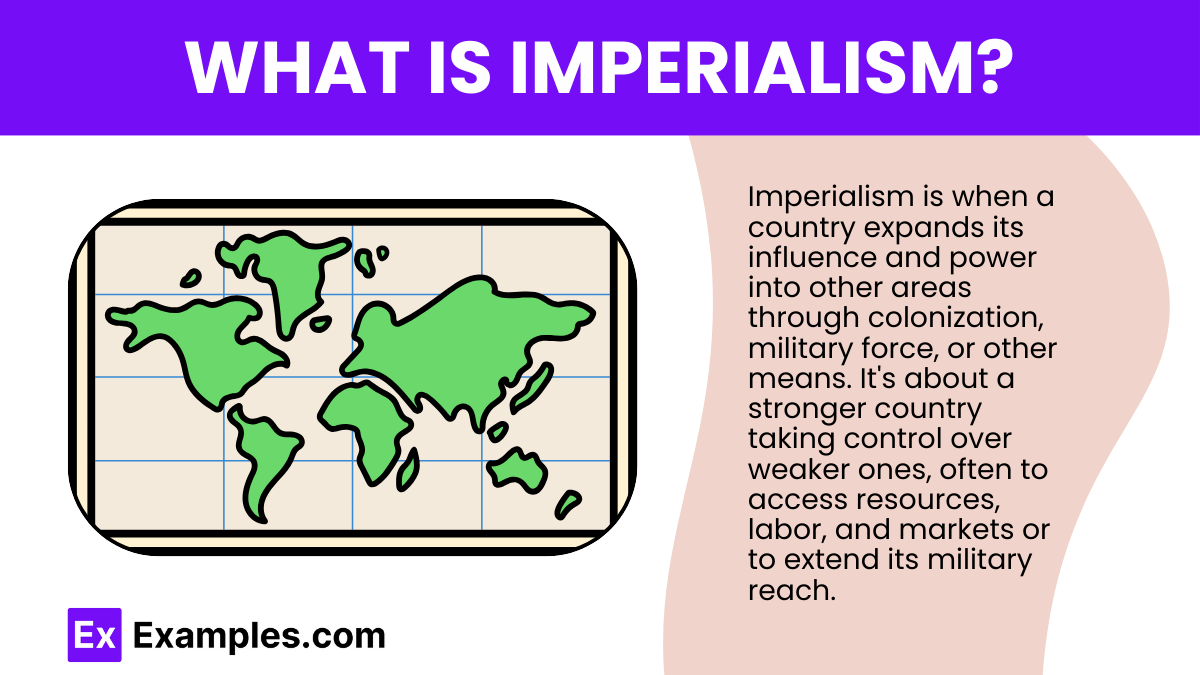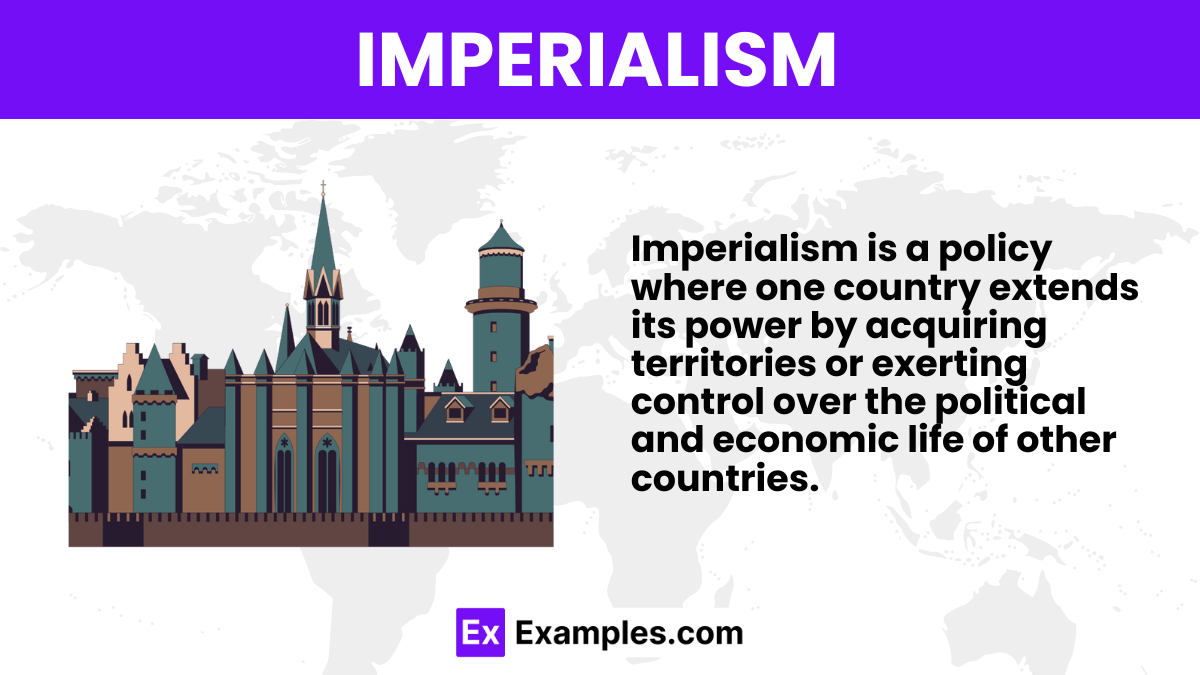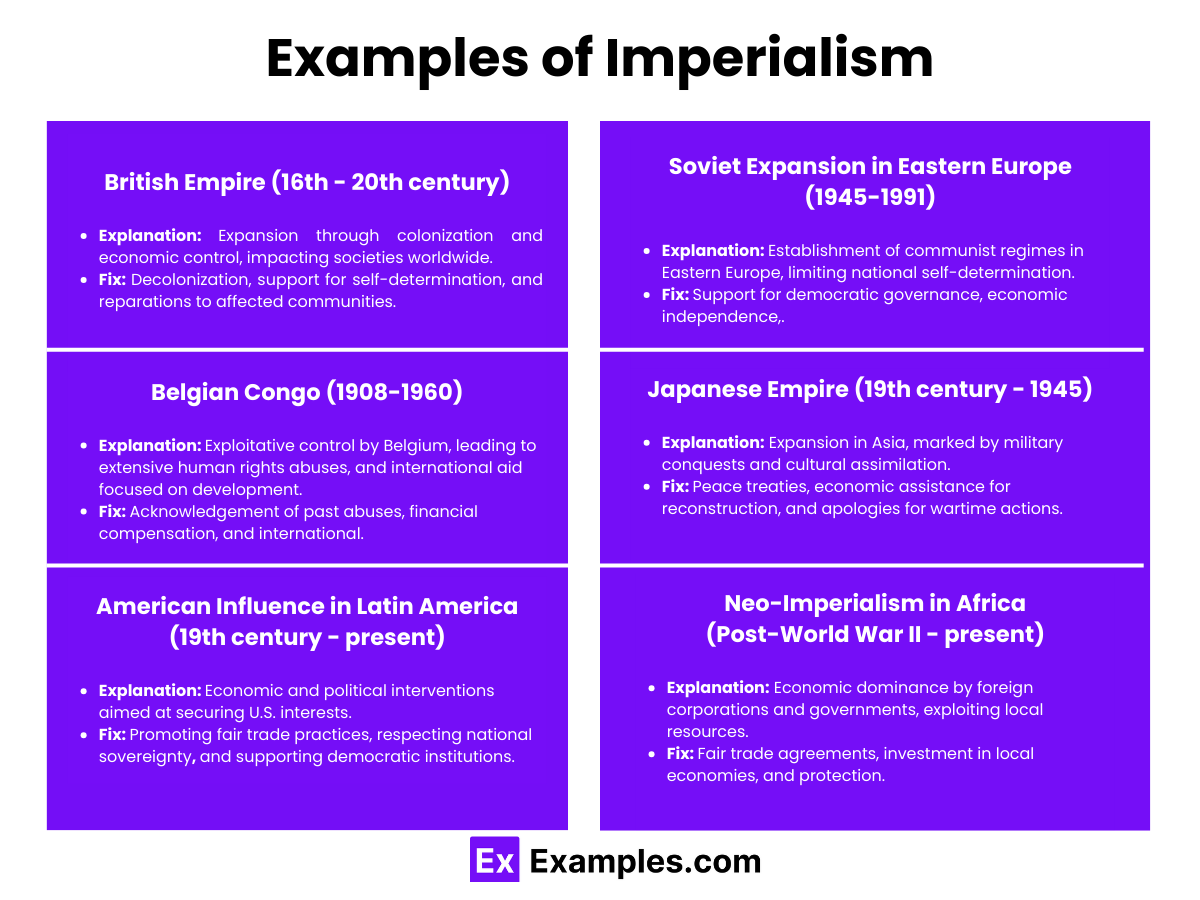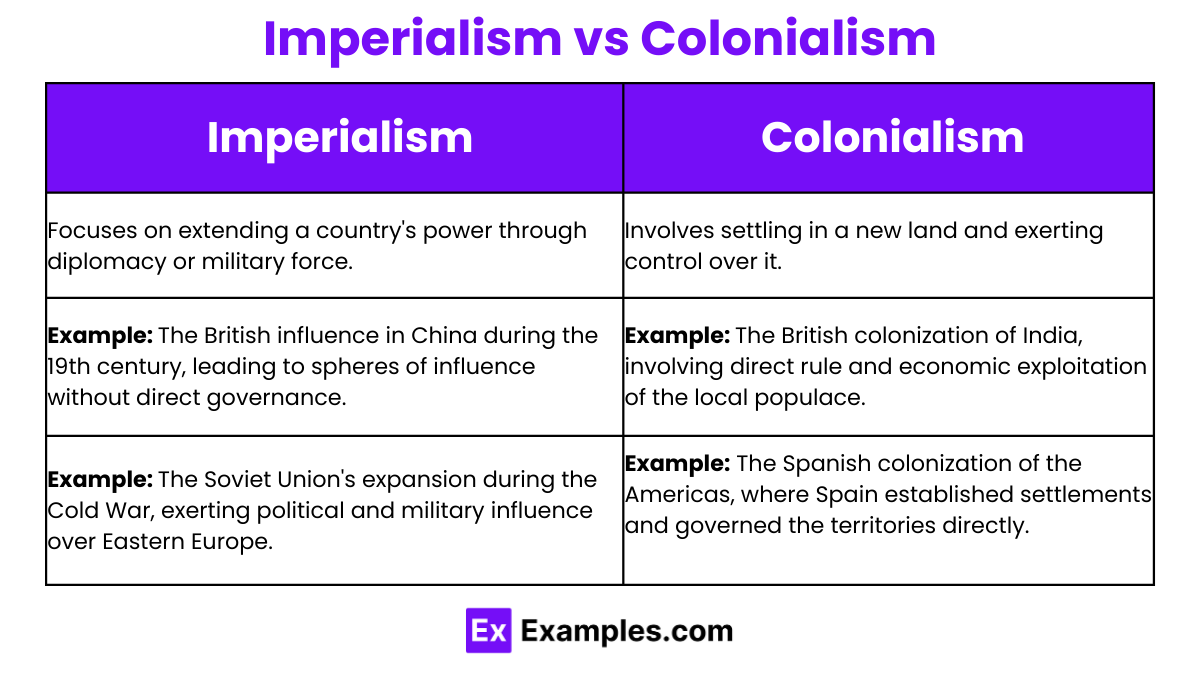10+ Imperialism Examples
Imperialism is a policy where one country extends its power by acquiring territories or exerting control over the political and economic life of other countries. This comprehensive guide explores the concept of imperialism through historical examples and its impact on global relations. From the colonial empires of the 19th century to modern forms of economic dominance, understand how imperialism shapes world dynamics, influences cultures, and alters the course of nations. Discover the forces behind imperialism and its lasting effects on both the oppressors and the oppressed.
What is Imperialism?
Imperialism is when a country expands its influence and power into other areas through colonization, military force, or other means. It’s about a stronger country taking control over weaker ones, often to access resources, labor, and markets or to extend its military reach. This can lead to changes in the culture, economy, and government of the controlled country. Imperialism has played a major role in history, shaping many of the world’s borders and societies. It often leads to conflict and resistance from those who are controlled.

Theories of Dictatorship
- Modernization Theory: Suggests that dictatorship is a transitional phase countries may undergo towards becoming modern democratic societies. Economic development and education are seen as pathways to democracy.
- Authoritarian Bargain Theory: Proposes that citizens may accept authoritarian rule in exchange for stability, economic growth, or security, often following periods of turmoil.
- Resource Curse Theory: Argues that countries rich in natural resources are more likely to experience dictatorial rule, as the wealth from resources enables the ruling elite to maintain power without needing to tax or gain consent from the populace.
- International Pressure and Sanctions: Global condemnation, targeted sanctions, and diplomatic isolation can pressure dictatorial regimes to adopt reforms.
- Support for Civil Society: Empowering NGOs, media freedom, and educational programs can build a resilient civil society capable of demanding change.
- Economic Development and Education: Fostering economic opportunities and access to education can encourage a more politically engaged and informed citizenry, challenging dictatorial power structures.
Examples of Imperialism
British Empire (16th – 20th century)
- Explanation: Expansion through colonization and economic control, impacting societies worldwide.
- Fix: Decolonization, support for self-determination, and reparations to affected communities.
Belgian Congo (1908-1960)
- Explanation: Exploitative control by Belgium, leading to extensive human rights abuses.
- Fix: Acknowledgement of past abuses, financial compensation, and international aid focused on development.
American Influence in Latin America (19th century – present)
- Explanation: Economic and political interventions aimed at securing U.S. interests.
- Fix: Promoting fair trade practices, respecting national sovereignty, and supporting democratic institutions.
Soviet Expansion in Eastern Europe (1945-1991)
- Explanation: Establishment of communist regimes in Eastern Europe, limiting national self-determination.
- Fix: Support for democratic governance, economic independence, and cultural restoration.
Neo-Imperialism in Africa (Post-World War II – present)
- Explanation: Economic dominance by foreign corporations and governments, exploiting local resources.
- Fix: Fair trade agreements, investment in local economies, and protection of rights for workers and communities.
Japanese Empire (19th century – 1945)
- Explanation: Expansion in Asia, marked by military conquests and cultural assimilation.
- Fix: Peace treaties, economic assistance for reconstruction, and apologies for wartime actions.
Issues of Imperialism
Imperialism, the policy of extending a country’s power and influence through colonization, use of military force, or other means, has led to numerous issues and controversies, both historically and in contemporary times. Some of these issues include:
- Cultural Erasure and Assimilation: Imperial powers often imposed their own culture, language, and values on colonized societies, erasing indigenous cultures, traditions, and languages.
- Economic Exploitation: Colonized regions were frequently exploited for their resources, benefiting the imperial power at the expense of the local economy and people.
- Political Instability: The artificial borders drawn by imperial powers have led to ongoing conflicts and instability in formerly colonized regions.
- Social Inequality: Imperialism often institutionalized racial and ethnic hierarchies, leading to long-lasting social and economic inequalities.
- Loss of Sovereignty: Colonized nations lost their sovereignty and the ability to make decisions in their own best interests, affecting their political and social development.
- Environmental Degradation: Exploitative practices and the introduction of non-native species by imperial powers have had lasting impacts on local environments and biodiversity.
Imperialism vs Colonialism
- Imperialism refers to the policy or ideology of extending a country’s power and influence through diplomacy or military force. It’s broader than colonialism, encompassing a range of methods for exercising power over another country or territory, including economic dominance, cultural influence, and direct political control. Imperialism can exist without the establishment of colonies.
- Colonialism, on the other hand, is a practice of imperialism that involves the acquisition and exploitation of one territory by another country. It specifically refers to the establishment of settlers in a territory and the exploitation of the native population. Colonialism is a form of imperialism that includes direct administration of the conquered territory, leading to the creation of a colony where the imperial power exerts full control.
Imperialism |
Colonialism |
|---|---|
| Focuses on extending a country’s power through diplomacy or military force. | Involves settling in a new land and exerting control over it. |
| Example: The British influence in China during the 19th century, leading to spheres of influence without direct governance. | Example: The British colonization of India, involving direct rule and economic exploitation of the local populace. |
| Example: The Soviet Union’s expansion during the Cold War, exerting political and military influence over Eastern Europe. | Example: The Spanish colonization of the Americas, where Spain established settlements and governed the territories directly. |
History of Imperialism
The history of imperialism spans centuries, reflecting a complex web of power dynamics, conquests, and the exertion of influence by stronger nations over weaker territories. It’s a narrative that intertwines the aspirations, economies, and politics of diverse peoples and lands across the globe.
Early Forms of Imperialism
Imperialism’s roots trace back to ancient empires, such as those of Egypt, Rome, and China, where powerful states expanded their territories through military conquest and colonization. These empires sought to extend their dominion for resources, labor, and strategic advantages, integrating conquered peoples through administrative, cultural, and economic means.
Age of Discovery (15th – 17th Century)
The Age of Discovery marked a pivotal expansion of European imperialism, driven by maritime exploration. European powers, including Spain, Portugal, England, France, and the Netherlands, established colonies in the Americas, Africa, and Asia. This era was characterized by the search for new trade routes, the exploitation of natural resources, and the establishment of trade monopolies.
Colonial Imperialism (17th – Early 20th Century)
During this period, European nations solidified their control over vast territories, particularly in Africa and Asia, through direct colonization. The “Scramble for Africa” in the late 19th century epitomizes this phase, with European powers dividing the continent among themselves with little regard for indigenous cultures or historical boundaries. This era of imperialism was justified by ideologies such as the White Man’s Burden, which posited a moral obligation to civilize non-European peoples.
Economic Imperialism (Late 19th – Early 20th Century)
Economic imperialism emerged as nations sought to extend their influence primarily through economic means rather than direct territorial control. This was evident in Latin America, where European and American investments dominated local economies, and in China, where spheres of influence granted foreign powers special economic rights.
Decolonization (Mid 20th Century)
The aftermath of World War II saw a significant shift against imperialism, as anti-colonial movements gained momentum across Asia, Africa, and the Middle East. The process of decolonization led to the emergence of new nations and a reconfiguration of global power structures. The United Nations played a crucial role in supporting self-determination and independence for former colonies.
Neo-Imperialism and Globalization (Late 20th – 21st Century)
In the contemporary era, imperialism has taken new forms, often referred to as neo-imperialism, characterized by economic, political, and cultural influence rather than direct colonial control. This period is marked by the dominance of multinational corporations, the strategic interests of powerful nations in developing countries, and the global spread of Western culture. Globalization has facilitated this by increasing interconnectedness, but it has also raised concerns about economic exploitation and cultural homogenization.
FAQS
Who started imperialism?
Imperialism, as a policy or practice, doesn’t have a single originator; it evolved over centuries, practiced by various empires and states.
Why is it called imperialism?
The term derives from “empire,” reflecting the policy of extending a country’s power through territorial acquisition or political control.
In summary, the table of imperialism highlights the complex interplay of power, culture, and economics shaping our world. Recognizing the legacies of imperialism is crucial for understanding current global dynamics and fostering a more equitable future. Addressing its impacts through education, reparations, and support for sovereignty and self-determination remains imperative for global harmony and justice.




